We can lose fat by eating carbohydrates. We explain how you can lose weight without giving up your beloved “carbs”.
I constantly receive tweets or e-mail where the person comments on how after losing weight for a few weeks, they reach a point where they become stagnant or simply lose less weight than in the previous weeks.
Although I risk looking like a person repeating the same thing over and over again. what, this process is largely due to two reasons:
- By cutting back on carbohydrates , the first few days you lose glycogen (the way carbohydrates are stored in our body) and water. Each gram of glycogen holds 3-4 g of water, so if you lose 250 g of glycogen, you lose 750 g of water, for a total of 1 kg doing practically nothing.
- When reduce calories , your body sets in motion a series of mechanisms to consume fewer calories (survival mechanism), so if previously a deficit of 300 calories a day was enough, now it is not up to it.
Now let’s do an example:
One person saw that eliminating carbohydrates he lost weight , and that instead, by keeping or increasing them, he regained part of the weight lost.
The conclusion? Carbohydrates are the personification of evil and fats are what keep you “dry” by not increasing your insulin. Is this really so?
It’s possible to lose fat by eating carbohydrates?
Time and calories mark the success of the diet; are the key when it comes to losing fat.
Anything that helps you improve long-term grip will result in a increased fat loss.
A large percentage of people on very restrictive carbohydrate diets (such as ketogenic diets) observe how their cravings for carbohydrate-rich or even sweet foods increase compared to people on a mixed diet, which will increase the chance of failure in the long term.
Some 1 reviews show that the weight loss achieved is associated with the duration of diet and calorie restriction, but not carbohydrate restriction.

When we look at the studies, high-fat diets lead to greater weight loss than to a diet rich in carbohydrates.
What-the-studies-tell us?
The problem arises when we see that all these studies are at short term 2,3,4,5,6 where none of them exceed 6 months .
Obviously this methodology is not valid, since according to some observational studies , people begin to “weaken” with their diet after the middle of the year (just when the above-mentioned trials end).
When we look at studies with a duration greater than 6 months , we observe that there is no difference in weight loss between a high carbohydrate content or a high fat content 3.7 as we observe in the following image:
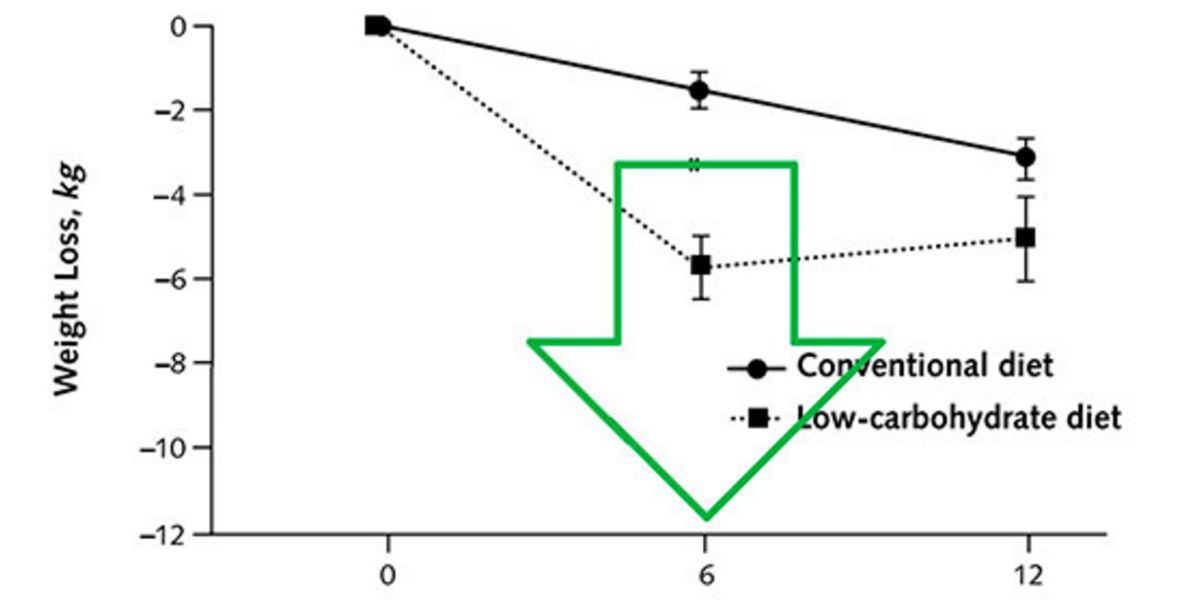
After 6 months, most people on a low carbohydrate diet start to gain weight.
Knowing that diet time is a key factor, the role of calories remains to be seen.
Of course, losing weight requires a calorie deficit (eating fewer calories than we consume), or in other words, any diet will make us lose weight if we consume fewer calories.
This means we can merge SUGAR or FAT together to protein and lose weight.
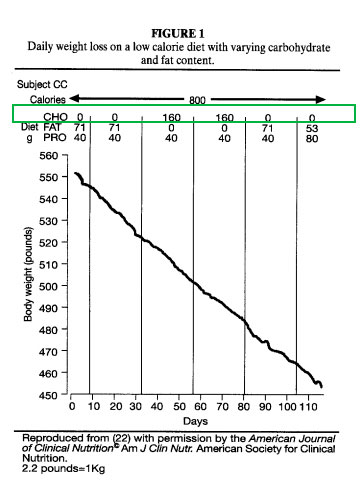
As we can see in the graph above, if our calories are adequate, increase or decrease the carbohydrates gives the same fat loss.
The co Is lpa a carbohydrate?
Although many try to base their reasoning on the fact that carbohydrates prevent fat loss by increasing insulin, the reality is completely different.
It is true that when insulin rises, the oxidation of “fats” by the cells decreases. In other words, every time we put glucose into our body, our cells will use more glucose and less fat.
However, this only lasts a few hours (depending on the amount of carbohydrates we consume). After these hours our body will use fat without any problem, as shown in the following graph:
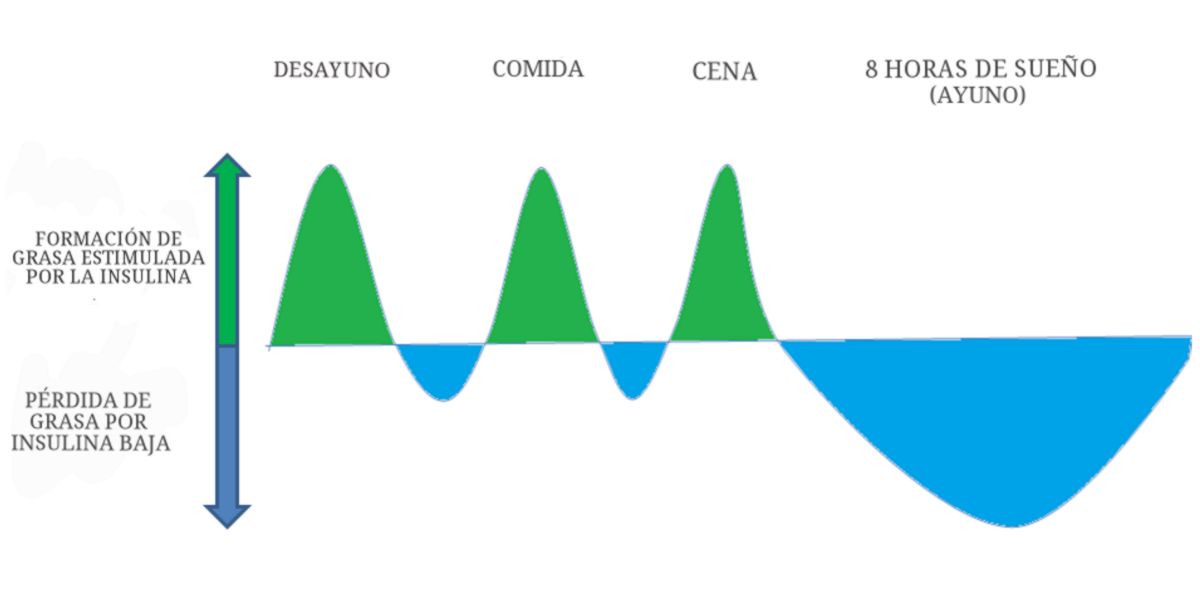
From a metabolic point of view, carbohydrate intake increases metabolism 3 times more than fat (Almind & Kahn, 2004 ).
In fact, it has been observed (in rats) that when insulin is injected their metabolism increases and their caloric intake is lower 8.
The reason why this does not happen in obese people it is because they have insulin resistance, or in other words, the brain does not detect the insulin signal and therefore its metabolism is KO and his feeling of satiety is low, but as I repeat, it is in obese or overweight people.
What happens with sportsmen?
In a person who performs weight training, it is very unlikely to experience such resistance (unless it is in a fired volume phase and sharply increases its fat percentage).
Carbohydrates and palatability
The problem with carbohydrate-rich diets is their high palatability.
In other words, they are tasty foods, so exceeding calories becomes really easy (especially in those foods with a higher glycemic index and load). On the other hand, we live in an age where food portions have increased , especially at the level of children 9.
This group of factors gives the following result:
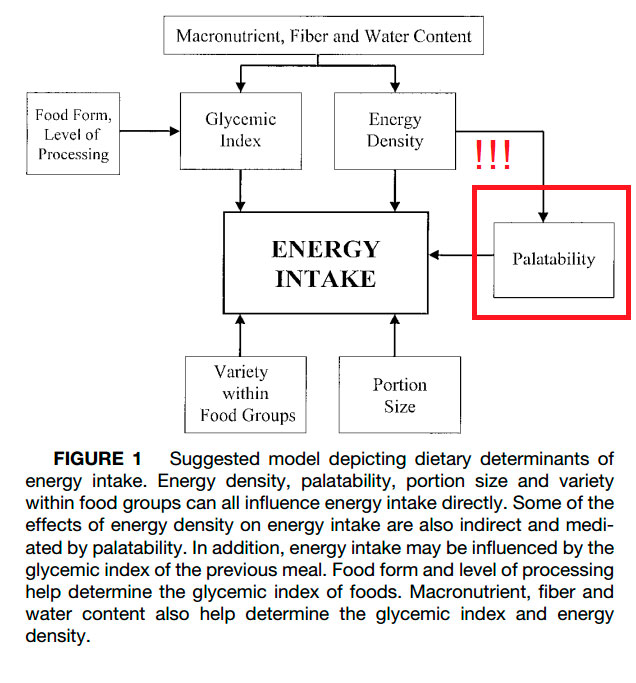
In this way, it is not that carbohydrates are preventing you from losing fat, but that you are eating more calories than you need.
Calories VS Carbohydrates
Looking at this panorama, we can see how the important factor is the calories and not the amount of carbohydrates we consume (assuming you have adequate protein intake).
A high intake of carbohydrates on a specific basis (in people who train), does not lead to an increase in our percentage of fat , as most of it will be stored in the muscle and liver, and any excess is oxidized from our cells.

Our body is not interested in storing fat as it would make us less efficient, so increases T3 levels, system sympathetic and leptin so that it uses calories more easily, or that is the same, our body burns more calories at rest .
This fact is of great importance when it comes to losing fat, since as I said before, when we follow a low-calorie diet (low in calories), our metabolism becomes slower and consequently our diet stops working.
Diet and REFEED
If we compare a common calorie and carbohydrate reduction diet with a diet with REFEED or high carbohydrate days, we get the following:
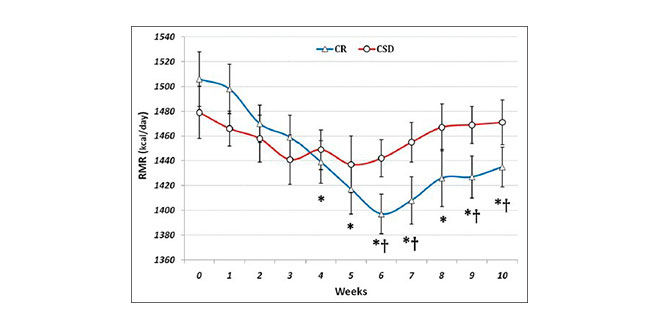
The REFEED diet (red line) maintained metabolism at almost identical levels to when the diet was started, which did not happen by maintaining a low calorie intake.
Conclusions
The type of carbohydrate will affect the feeling of satiety for a long time term.
The introduction of refined foods (IIFYM protocol, which you can find here) can make us exceed calories or even when we get a calorie intake, our mental state has its price, a worse mood, an increased obsession with food or a feeling of hunger .
In conclusion, we can see how a moderate intake of carbohydrates can lead to the same fat loss as a low-carb diet, even when it comes to of percentages of fat I know less than 10%.
For this reason, if you feel more comfortable and feel better following a moderate carbohydrate diet , continue with it and don’t dwell on the myths.







